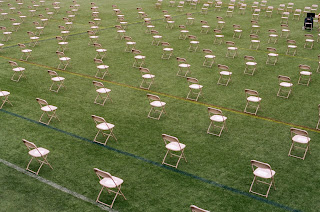Minimalism and frugality go hand in hand, at least when it comes to fashion consumption. Adopting a frugal lifestyle and frugal shopping habits will at some point come back to minimal use of resources, and doing more with what you already have rather than constantly buying more, and buying new. Minimalism has recently gained traction as a global trend, especially visible on social media, spreading the philosophical, practical, environmental and in some cases spiritual message of using less to achieve more.
Most religions and spiritual movements have
contained components of minimalism at one point or another, a heritage that
undoubtedly can be spotted in today’s minimalist movement. It can be argued
that religious practices to a large extent is about putting things in
perspective; the human in relation to God, the earth in relation to humans, the
meaning of life on earth in relation to what comes after. It is about
differentiating what is important from what is trivial, and about living a life
of meaning – whatever that means to the individual. In this sense, the very
concept of religion is minimalistic, and quite simple really.
Minimalism has also revolved around
decluttering physical spaces, often with the semi-spiritual aim of cleansing
the mind and creating a cleaner and simpler existence. Minimalism has in
general been focused on eliminating clutter, and the spiritual side of the
movement has used this practice as a way to shift attention from physical
possessions to non-materialistic value. Minimalism is about discarding anything
that takes attention away from what we value the most, much like many religious
practices are about focusing one’s attention towards the holy by getting rid of
earthly or humanly distraction.
But there are also far more tangible ways in
which minimalism has been related to religion. Jesus is quoted saying “If you
want to be perfect, go and sell all your possessions and give the money to the
poor, and you will have treasure in heaven” (Matthew 19:21), and the prophet
Muhammad advised that “wealth is not in having vast riches, it is in
contentment”. Minimalism is “as old as scripture itself”, and it has
shaped and continues to influence religion across cultures.
The current minimalism movement is
characterised by a distinct non-religious but yet semi-spiritual undertone. It
is about finding meaning in the non-materialistic, non-physical aspects of the
human life. It is about stripping away the unessential, in order to make space for
whatever is essential to the individual. Despite its message of individualism,
positive change and promises of freedom and opportunity, modern minimalism is
also dominated by rules and expectations. Only use 33 pieces of clothing, throw
away anything that does not spark immediate joy, digitalise, downsize, do not
seek to impress others with material objects. Do not live in the material
world, but live in and for something else – whatever you want, wherever you
want, just not in the material. The movement has a clear standard for what is
good and what is bad, what is expected of someone who calls themselves a
minimalist and what is considered acceptable behaviour. The movement has in
recent years been criticised for gatekeeping minimalism, as well as demanding
high standards for what is considered minimalistic, thus alienating outsiders. From
the outside it might therefore seem like the minimalism wave is a strict and
exclusive community for those proven worthy of the title minimalist. It is
because of this that many have argued that there are strong similarities between
the minimalist movement and religion, and thus that minimalism should be
considered a spiritual, semi-religious movement.
Nevertheless, minimalism is not a religion,
despite its undeniably spiritual undertones. It is rather a movement of
simplicity, of limiting resources and reducing one’s amount of unnecessary
material hoarding. Minimalism has also established strong roots in the
sustainability movement, preaching the benefits of reduced shopping, reusing what
is already available, and recycling what has to be discarded. Perhaps the
non-religious face of today’s minimalism movement gives it the potential to
reach further, and become the truly global trend no religion has ever been? Perhaps
minimalism’s frugal focus is what we need to tackle the looming, and even
ongoing, climate crisis?



